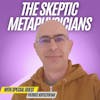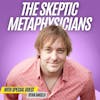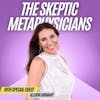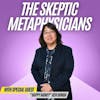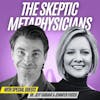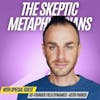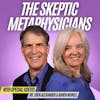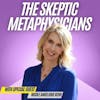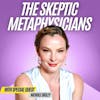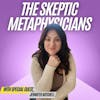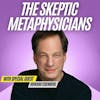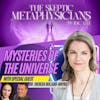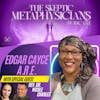Should We Fear Death? An Honest Conversation with a Hospice Nurse!

Join us as we explore the mysteries of death and dying with a hospice nurse who believes it's a beautiful, natural process. But as she delves deeper into the topic, she reveals eerie phenomena that happen to almost everyone at the end of life. Just...
Join us as we explore the mysteries of death and dying with a hospice nurse who believes it's a beautiful, natural process. But as she delves deeper into the topic, she reveals eerie phenomena that happen to almost everyone at the end of life. Just when you think you've heard it all, she drops a bombshell that will leave you questioning everything. Don't miss this fascinating conversation, and the shocking ending that will leave you wanting more.
"Our bodies are naturally built to die. And ultimately, as weird as this sounds, it's beautiful." – Hospice Nurse Julie McFadden
In this episode of The Skeptic Metaphysicians, hosts Will and Karen talk to hospice nurse Julie McFadden about overcoming the fear of death. As a former ICU nurse, Julie has seen a lot of death and has specialized in assuring families during the time leading up to death. Julie shares her insights on why we shouldn't fear dying and how to process the topic of death. The hosts also reflect on their own fears of death and their journey of discovery into the metaphysical world.
Some topics we cover:
- Overcoming fear of death
- Trusting the universe
- The beauty of death
- Fear of the unknown in death
- Seeing people before death
- Visioning before death
- Seeing souls leaving bodies
- Witnessing someone actively dying.
- Atheists and Death
- Actively dying process
- Dying is a natural process
- Misconceptions about dying
- Death and afterlife beliefs
For a lot more information about this episode, visit our website for the full show notes and summaries:
https://www.skepticmetaphysician.com/blog/should-we-fear-death-an-honest-conversation-with-a-hospice-nurse
Other episodes you'll enjoy:
Is There Life After Death
https://www.skepticmetaphysician.com/is-there-life-after-death
Proof of the Afterlife?
https://www.skepticmetaphysician.com/proof-of-the-afterlife
What Happens When We Die? A Near Death Experience Story https://www.skepticmetaphysician.com/what-happens-when-we-die-a-near-death-experience-story
ABOUT OUR GUEST:
Julie McFadden, BSN, RN has been a nurse for 15 years. Julie is an experienced ICU, and now Hospice/Palliative Nurse. Julie has been featured in Newsweek, USA today, The Atlantic, The Business Insider, Medscape, People, Buzz feed, and several other articles worldwide.
Julie has been passionate about normalizing death through education to the masses using social media.
Her tiktok has 1.2 M followers, and you can find her on all social media platforms (Instagram, Facebook, and YouTube) at Hospice Nurse Julie.
Guest Info:
Website: https://www.hospicenursejulie.com
Instagram: https://www.instagram.com/hospicenursejulie
Facebook: https://www.facebook.com/profile.php?id=100077937666311&mibextid=LQQJ4d
YouTube:
Will: [00:00:00] Karen? Yes. Remember when we first started the show? Mm-hmm. What was my number one biggest fear? Death. That's right. I was the biggest baby when it came to death, right? Mm-hmm. Now, through the course of us doing this show, That fear has lessened a little bit. Oh, that's good.
But as a skeptic, the thought of dying every once in a while still rears its ugly head and makes me drop into a panic. Right. Hmm. Well, this week we're speaking with someone that specializes, for lack of a better word, in assuring families during the time leading up to death, and what she's got to say why we shouldn't fear dying is going to stick with you for a long time after this interview.
You don't wanna miss this episode of The Skeptic Meta Physicians starting right now.
[00:01:00]
Karen: Well, no, because you're the one telling us about your check. Okay. And it's ju jo
Will: Karen. Yes. Every once in a while. You think that you are really on the right path.
You are dead on. You're going, you're progressing perfectly. You have left behind all the judgmental and egotistical kind of personality traits that you have, and that is when a universe says, bam,
Karen: time for a gut check
Will: time for not only a gut check and an all round check. from personal experience.
Mm-hmm. It's important to remember that we are all a work in progress, and just when you think you've got it all figured out, that's the time to [00:02:00] realize you don't have anything figured out because the universe is so much more complex. Than we would possibly imagine.
Karen: Well, I think that's when the ego kicks in.
You know, when you're like, oh, I've got it figured out. I've made that goal check. Mm-hmm. You know, because as humans, that's what we want. We wanna be able to reach that level. Mm-hmm. Or any level, the next level.
Will: Yeah. A absolutely. And, and I, I think there's, it's like a, it's like a natural inclination to, as you're getting good at something, you start thinking that you're really good at something.
And, Well, maybe I should share a story. Yes. That just happened to me recently. a lot of people will, will remember us, us talking about the fact that we are going through a tumultuous time in our professional lives. Mm-hmm. The company that I worked for was going through a reorganization and job was eliminated, but I was invited to apply for these other positions that were there within the organization.
One of which, Was tailor made for me or so I thought. Mm-hmm. So I interviewed for [00:03:00] two different positions. The one that was tailor made for me and the one that I already had, but with bigger responsibilities and thought I aced both interviews, like I just crushed it. I was so sure, I'm so convinced that I've got this job that I know I'm perfect for and all that kinda stuff.
Only to learn more, more. Nope, I got the other one. I got the one that I'm already doing. Mm-hmm. But with bigger responsibilities. But what happened when I was told that I did not get the other job that was tailor made for me was such a punch in the gut that I immediately fell back into the ego centered thought process, and I was really upset.
I remember that. Yeah. Like, like really upset to the point of you and I talked about resigning. Mm-hmm. Like, I'm, I'm done, I'm outta here. they don't appreciate me, blah, blah, blah. And then, and then I had a special, somebody remind me, I should probably reread the Surrender [00:04:00] Experiment.
Mm-hmm. Those who don't know the book, the Surrender Experiment. It is a fantastic book about the importance of just trusting the universe and knowing that the universe is going to put you in the best place possible, and for some reason, The universe thought that that job was not the best place for me.
And
Karen: I think going back you could look at all of those reasons and see them glaring at you in blinding light. But still maybe, maybe that light blinded you because you didn't see them. Well,
Will: what blinded me was my ego. Well, that's true, because suddenly I'm being rejected or denied a job that I thought I was perfect for, which would've been a promotion.
Mm-hmm. And all I felt was betrayal. Right, and that's all that I saw. But you're right. Going back with a different perspective mindset and looking at the potential, looking at the messages that the universe has been sending me, it is glaringly obvious that if I had accepted that other role, [00:05:00] the direction that we want to head in, We would not have been able to
Karen: do.
Absolutely not. And I think the, the message is so interesting because, you know, you work and you try really hard and, and for us, we have been on this spiritual journey or quest and you know, you kind of feel like, okay, I'm at this level, but bam, not really. Hmm.
Will: I, I think there's so many lessons there.
Mm-hmm. One of which obviously is surrender. Mm-hmm. Everything is gonna work out the way it's supposed to. The universe has better plans for you, and if you trust the universe, it will take you to where you are supposed to be, right? But then also don't think that you are disconnected from ego as much as you think you are, because the act of becoming much more spiritual
I mean, you hear it all the time. Spiritual teachers who then suddenly lose themselves. Mm-hmm. Because they, allow their own thoughts of themselves to take over, and suddenly the ego sneakily [00:06:00] comes in and takes over. Mm-hmm. And then all of a sudden you're. Found to be more human than you thought you were.
Karen: Well, it's really a lesson in humility. Absolutely. You know, and And that is part of the surrender. Absolutely. The surrender. Being humble, not thinking too much of yourself, just quieting all of those thoughts so that you can really hear the lessons.
Will: Yeah. And when I think about it now with a fresh perspective of a better mindset, We're here to serve others.
We are, our role in this life is to serve others. And if you can't be humble in the service of others, then really who you're serving is yourself. And that's probably the biggest lesson that I've had to face doing all this, going through this change at work that, uh, I thought I was serving others, but at the time, Really, it's, it feels very self-serving.
Well, now that I've got that off my chest, let's, get started with the show.
Karen: Let's get started.
Will: Hi there. I'm Will. And I'm Karen. And this week's feature [00:07:00] interview is all about overcoming the fear of death and to help us process this topic. I can't think of anyone better than hospice nurse Julie McFadden to broach the topic Now, Julie was an I C U nurse for eight years and seen a lot of death in her time.
Well, she eventually transitioned into hospice nursing and saw the power that each body has to die naturally and. How beautiful the experience really was. Now she educates people on how we die and how natural a process it is. Now you've seen her on Newsweek, the New York Post, USA Today, and The Atlantic.
Welcome to the show, hospice Nurse Julie McFadden. Thanks so much for coming
Julie: on. Hi you guys. Thank you for having me.
Will: it's a pleasure to have you. Thank you for saying yes because this is a topic that. Has always like, you know, it, there's like this primal fear that comes along with dying, right? The thought of maybe there's nothing after this is something that kind of freaks [00:08:00] everybody out.
So, having someone that has seen death as often as you and has prepared people for the eventuality, it's nice cuz I'm a hundred percent sure. That you're gonna make me feel completely relaxed about Yeah. After
Julie: this, right? No pressure. No pressure. All right. Well, that's my hope. You know, that's my hope.
I do have a lot to say about it, and I'm, yeah. I'm into talking about death and dying. So let's, let's do this.
Will: Okay. let's just get right into it. Why do you say that death is beautiful, that that's not, that doesn't seem like a word that would come to mind when you think about
Julie: death. I know.
Well, you know, it's because, so one, I haven't always thought that, and when I was an I C U nurse, I really didn't think that I, I, I was, it was, I. Traumatic, uh, working in as an ICU nurse and watching death that way. And that actually got me thinking and, and thinking to myself, you know, there has to be a better way if people are going to die.
There are some thi, there are some diseases specifically [00:09:00] that unfortunately it is the inevitable thing. And I think, and I thought to myself, there has to be a better way, which got me into hospice work and it took me about a year to, you know, see how the body. Naturally died because I was so used to being the nurse and working with doctors who, where we did a bunch of interventions so you couldn't die.
And still eventually people would, but, but as, as a hospice nurse, you see the, how the body naturally dies. Um, and after about a year of seeing it over and over again and seeing how most people do, most people's bodies do the same thing. And we naturally have built in mechanisms to help us die naturally and mostly peacefully.
Um, I say mostly because specific diseases, you can have symptoms from the disease, which can cause pain and issues, and people associate that with death. But really that's the disease [00:10:00] our bodies. Are naturally built to die. And because it's not my loved ones specifically at my work, right? It's, it's a patient and their loved ones and the family's loved one.
It's like because the grief is removed, I can just see it for what it is. And ultimately, a, as weird as this sounds, it's beautiful. It is truly like watching a baby being born. Because I've also seen that as a nurse, you know? Do you see, you see things, right? I mean, I don't, I haven't seen it often cause I'm not a labor and delivery nurse, but.
Um, like even when I watch videos of like a child being born, I could weep, right? Because you see this new life, it's like they're coming in on like a wings of angels. And that's, that is honestly how it feels to watch someone take their last breath. Well, I
Karen: wanted to ask you something kind of what Will said, and before we really get into it, I know that, so you're a nurse, not necessarily a, a counselor, but dealing in hospice and with these families, I'm sure you do a lot of consoling and [00:11:00] comforting.
Have you found that what most people fear is. The being dead or the process of dying because Will says, you know, he was always afraid of what happens after that. To me, if the lights are out, the lights are out. It's the process for me that I'm worried about. I want it to hurt. You know, that, that's more of my fear than
Julie: what's after that.
I think. Because when I'm approaching the family, right, they're looking, they're looking at me at, with a label as like nurse. Mm-hmm. Right. So they are not many of them. Some, some will talk to me about what's going to happen after, just on a philosophical. Like, just, just philosophically, right? Because they know, I don't actually know.
So most of my conversations, I would say, because I'm the label of nurse, uh, is people asking me about like what to expect, right? Mm-hmm. So a lot of the fear, at least from what they're talking to with me, is about like, what, what to expect, what's this going to be like, what's this process going to be like?
How long do I have? Um, what can I expect? And, and really normali what [00:12:00] I see is when I normalize what's happening to them, and I seem to come with an authority of like, here's what I ex not myself, anyone who works in hospice, right? Who's around it all the time. It does seem to put people at ease, and that's why I always say education around death in, in specific deaths, you know, specific deaths with specific diseases.
Even though it sounds like that would be scary, it really does seem to do the opposite. It really seems to help people, you know, just have a better idea of what to expect, uh, versus pe because why people fear it is cuz it's the unknown. Mm-hmm. So if you can give them any type of certainty or, or knowing in any way, it feels like it alleviates some of that fear.
Will: Well, so my fear lies more on the other side of the coin, right? What happens after we die? you're really talking about the physical, I mean, I don't wanna say the word deterioration, but there it is. I said it there's a certain amount and I've, I've done a little bit of [00:13:00] research into what you're talking about, and you mentioned that, there's a lead up, right?
Almost everybody goes to the same. Thing where you don't eat or drink for a while, you don't need as many calories. There's a lot of the whole process behind it. so I understand that part of it. But if someone is actually faced with their own mortality, how does knowing that their body is shutting down help them to
Julie: get through that?
Okay. So, so this will tie into also about what happens to us afterwards. Okay. And again, I know enough to say that I don't know. I, I, I, I, I'm skeptical of anyone who's gonna be like, this is exactly what happens, you know? Mm-hmm. Like, I appreciate that because I, people don't like living in uncertainty, you know?
And I'm the same way. So it's nice to hear people feel so certain about what happens after we die. Um, but I know enough to be like, I don't know. I don't know, but I do have my beliefs. Right. Okay. That's a whole nother topic, but Sure. In general, just so you know, the things that [00:14:00] happened to almost everybody at the end of life, Are.
There are some like scientific facts and like natural biological things that are happening in our body, but there are also like metaphysical phenomena, mysteries that happen to almost everybody at the end of life that we can't really as. Um, medical professionals explain, but we have to educate about it because it happens so often.
Mm-hmm. One of the main things that happens to almost everybody, if you ask them while they're dying, it's usually about a month before they die, is they start seeing people who've already died. So, It's usually people who bring them com or it's always people who bring them comfort. So I say family members, but only really family members.
If like you had a good relationship with 'em. Not everyone does, right? So like Right, you, they'll see their parents, their grandparents, aunts, uncles, friends, um, cousins, pets, people who have already died and they come to them and it's [00:15:00] usually physically, uh, sometimes in dreams, but it's usually physically and we'll.
Say, Hey, I'm coming to get you soon. You don't have to worry about anything. We'll be here around you. Um, and these people who, most of the people who experience this are completely lucid. They're alert and oriented. They're not like actively dying in hallucinating. There's nothing like that going on. And as a healthcare professional, we know what hallucinations look like, what delirium looks like.
Mm-hmm. What, what hypoxia looks like. Uh, it's not that, it's like a very distinct thing that happens to, um, I can't give you a direct number. I could like make up a number and say 80%. I have no idea. But it is more, I mean, it's a high number of, of people. Uh, it is a high number. Yes, a high number of people who experience this.
I'll take, and that's something that was so fascinating to me, that it's literally in our books we give to people to educate them about end of life. So families aren't scared when they start, when they start hearing their loved ones. [00:16:00] Say, Papa came to visit me last night and saying, I'm going home soon.
You know?
Will: So do you give that book to the person who's dying too? Or just the family? Yeah, because if, if it was me reading it, I suddenly, no one's coming to come at me a month before I'm dying. I'm getting really pissed off.
Julie: Right, right. Well, I, I do give it to the patient and I do, uh, and usually when I start explaining those things to the patient, they already tell me that's already been happening.
Oh, okay. So that is how I have learned that it happens so much. I think if you don't ask, many people won't tell you cuz they feel like they're crazy. Hmm. But when you start saying, I don't ask them directly, cuz that's strange. I think, I don't wanna intrude, but I'll say these things may start happening if it, if they don't, that's okay.
If they do, it's normal and then they'll pull me aside and be like, it's already happened, So in
Karen: your medical expertise,
Julie: Would you,
Karen: your guesstimate, I mean, I guess nobody really, really knows, but do you think it's really the family members or do you [00:17:00] think it's just like some sort of brain protecting ourselves by sending us these visions and these messages?
Julie: Hmm, good question, Karen. I know. I think it's really family members. I think it really is. I think everything that our body does, even watching the body biologically die, which, and it's a very, you know, scientific to me still feels really miraculous. Like, it feels miraculous that our bodies know how to die the way they do and the things that happen naturally to help us die.
That feels divine to me. Like I don't, um, I don't claim to like, I don't know, I don't know the words to describe it. I don't know what it's going to look like, but I feel like we all go to a place that feels like home. Like Mo, once we're there, it's like, oh, it's like a place we've always known and we had forgotten.
I always feel homesick for a place that I feel like I've once known. Mm-hmm. And I think when I die, that's what's go. That that's what, that's what's going to happen. I'm gonna go back to that place. Gosh. I hope so. I hope we all do. [00:18:00] Yeah, me too.
Karen: So we have talked to a few different people who have given us, near death experiences or they've been dead for a matter of minutes or seconds and come back and told us what those experiences are now in what you have seen, through your work.
Does the visioning happen only for people that are definitely. Dying or you know, if some, I know you're in hospice now, but maybe before that, if, if there was someone that was, you know, critical and then they died for a little bit and came back, would they have gotten the visioning before? Does that make sense?
Julie: Yeah, that makes sense. I don't. No, I don't know because, um, you know, I've only been really dealing with hospice and palliative care patients, like, specifically people who are dying and there is a pattern, you know, it usually is about a month to a few weeks before death. Every once in a while they do it closer to death, but it's usually, um, About a month before death With hospice specific patients?
Mm-hmm. Okay. People in the I C U, uh, you [00:19:00] know, I was a different person back then, a different nurse back then. I wasn't even thinking about talking or asking about if something happened, you know, it was more of like survival mode for me and for them. So I'm sure that has, I'm sure people have had experiences like that, but I don't personally, I don't personally have experiences like that.
Um, but I'm sure, I'm sure. Some people have.
Will: And, and then do you, have you had anybody who they read in the book that within, you know, a month or so before you pass away, you gonna start seeing people come after you? Have you had come after you? Well, I mean, you know, come, it's something you start seeing your loved ones.
You deceased loved ones. Have you ever had someone just like, oh my God, I'm gonna, I'm about to die. Cuz I just started seeing my grandmother come. Right. Do do people freak out? Cause now suddenly the clock
Julie: is ticking. Yeah. What's so funny is, uh, you would think, but no, be no, because the, the big distinctive factor of what we actually call visioning, it's like a thing we call it, is comfort.[00:20:00]
So it's, I think it sounds, it can feel a little fearful or, uh, but I would say 100% of the time, if it's really visioning, uh, the people are comforted. So even though it gives them a timeline, they're almost like, phew. I'm ready now because the, there's a visioning part is the comfort part. It's like the pla they're getting a taste of what's to come and it's good.
Now the family might be like, wait, what? You know? Cause they don't want them to go, right? Mm-hmm. But, uh, the patient is usually, I've seen many patients who were not okay with dying and then have visioning and be okay. So it's always, it's always comforting. It makes
Karen: sense because if this is, you know, a family member or someone that you loved that you've been missing for who knows how long, and at the same time your body is starting to fail and that can't be physically very comfortable, I would think you would feel good about leaving and transitioning off to, to be with these people that you cared about.
Mm-hmm.
Will: That's true. Yeah. Alright, [00:21:00] so we are just getting started, but we gotta take a break already just in case, because I know our conversation's gonna get hot and heavy. Now in a second, as soon as we get back, when we return, we are gonna ask the question. And we don't know the answer, so
we don't have an inside track into what she's gonna answer, but we're gonna ask the question of whether or not she's actually seen that, what six pounds or seven pounds actually leave a body? Has she seen a soul leave someone's body we're gonna get that question answered right after we come back.
Will: welcome back to The Skeptic Motor Physicians. We are talking to hospice nurse Julie McFadden, who. Is al just surrounded by death and she is here to tell us how beautiful it actually is and how comforted people are right before they pass. We talked about visioning, which is when past deceased loved ones come back [00:22:00] and, tell you how wonderful it is and you're getting ready to pass and we're there for you and comfort you and all that kind of stuff.
But then right before we took a break. I asked the question that I've been dying to ask. Everyone says that sometimes when someone dies, you can actually see the soul leave their bodies. And we've talked about before the break. I said it was six pounds or seven pounds. It's actually ounces.
Right? Thanks Karen. For, correct me, The body has been measured from my understanding, and, and you're about to maybe. Completely conflict that. But, there is a, an urban legend that a body weighs six ounces or seven ounces more when it's alive than when it dies. So first and foremost, is that true?
And secondly, have you ever seen a soul leave a body?
Julie: Okay, you guys? So as far as the body weighing less, yes. You know, I gotta say this, I don't know who's weighing these bodies cause I know we're not. Uh uh. I know the hospice team is [00:23:00] not weighing the bodies and people who you know, so I. I don't know. I think that might be an urban legend.
I think that might be an urban legend. That is a good movie though. Have you guys seen that movie? We have. Yeah. I love that movie. Uh, as far as I know, we're not weighing any bodies. It's, it's actually really hard to weigh a dead body. They're super heavy. Um, so I don't know, but have I seen a soul leave the body?
Also the answer is no. Ah, I do not see anything. However, I will say, uh, I feel like when I've witnessed someone take their last breath, which I have several times, um, I feel like the best way to describe it is like the room changing. It feels like a sacred moment. Or like where time stands still, when someone's in that moment of what I'd call actively dying and someone can be actively dying for a few days.
I mean, I've seen [00:24:00] someone actively die for like two weeks, which is abnormal, but hmm. In those last few hours, when you're really watching that person, that body, um, That room feels different and not necessarily bad, just different. It's kind of like expanded. It's like eternal, it feels like. And then they finally take their last breath and it's like it kind of all closes up again.
Not bad, just so, uh, something changes. There's an absence there, but I've never physically, so I feel like I'm a more of a feeler. If anything, I feel things versus see things. So I've never seen it, but I feel like I may have, may feel it. And
Karen: have you ever been in the room when someone is seeing one of their relatives and not that you saw it, but like, oh, she's over there in the corner or, or like been in that situation and, and if so, how did that feel?
Julie: Yes. Uh, several times. Uh, it feels, it depends sometimes when someone's [00:25:00] really, uh, alert and oriented and they're really seeing, I say alert and nornic. Cause I think people think, um, they're not, so people are just sitting around like us. Mm-hmm. And they will say like, You're not going to believe this, but I literally see my dad right there.
Right there. I see him. And of course, like none of us see the dad. Mm-hmm. And I just go along with it and I go, how? That's great. How do you feel about that? It's good. You know, he's been, keeps coming to me and he comes to me at night and, uh, so like sometimes it's like that and it doesn't feel weird or creepy and it honestly happens so often that as a hospice nurse you kind of get used to it.
Many people don't wanna tell you because they feel. Scared or weird about it. Mm-hmm. Um, the times where it feels like to me a little. Magical, for lack of a better word, is when someone like hasn't been speaking and it's not going the normal way, where like they're alert and oriented, but they've been kind of sleepy for like weeks.
And then [00:26:00] you walk in and they're like really fixated on a corner or something and they're not really speaking and then suddenly they do and they say like their husband's name or they say Jesus. Um, It doesn't matter about religion, but that happens to be their religion, right? So they're st or an angel or they, like, they're obviously talking to somebody that, um, they see that you don't, right?
And you can kind of feel the magic there.
those times for some reason feel a little more like, ooh, like you feel like you're in like a different space. The other times are just more like, wow, that's wild, because everyone's kind of shocked, you know?
Even the person seeing their loved ones a little bit, like, what the hell? You know? Yeah. I might
Will: be what I, ah, nah.
Julie: Yeah. I'm not ready. Not ready now.
Karen: Yeah. Have you noticed a difference between people who are, you know, religious or spiritual, and people who aren't with regards to visioning?
Julie: Not really, no. So I really don't feel, just from my [00:27:00] experience, I have no idea, right?
Mm-hmm. I have no idea. But from my experience, um, I'd say, uh, People who are religious or not religious, they all, they still vision. And like I said, if it's scary, it's not a vision. Visioning is not scary, right? Because people, cuz people with dementia and people can have delirium and people can feel like they're being followed by somebody.
Get paranoid. Get agitated. That's not visioning. Visioning is always comforting. So if it's not comforting, it's not visioning. Um, I would say I noticed a difference. You can be, I've definitely not noticed a difference in religion as far as like one person dying more, more, better than the next, right?
Mm-hmm. But I, I do think having some kind of faith, even if it's like faith in the universe, faith in other people, just some kind of like, um, it seems to help people.
Will: That was really my, my follow up question. Have you ever had someone who [00:28:00] really. Doesn't believe in anything. And the atheist who feels like once you die, lights out, period.
Have you ever had one of them suddenly start visioning and then start questioning that, that thought process?
Julie: I can't think of anyone specifically. Um, I am sure that has happened because many people I work with, uh, Or don't believe in anything. Mm-hmm. But I, so here's the thing is like, as the nurse, you don't always get the full gamut of what's happening, right?
People don't necessarily tell you, I don't believe in anything. And now I'm seeing someone, and now I do, uh, like because they're telling the social worker or the chaplain that also is on a hos a hospice. Team or their family members. But I would say, and I can't think of anyone off the top of my head, but I bet that has happened.
Just cause there are many people who don't believe in anything and think when you die, you die and will even vision and still think, I shouldn, that's my body, just making me feel better. And that's okay too, [00:29:00] you know, so. Mm-hmm. They don't necessarily become converted, but. They are comforted by it. Although
Karen: sometimes in those, those moments of need, you get real religious real fast.
Yeah,
Julie: yeah, yeah, yeah, yeah. Right. How often that happens. Yeah. Yeah. I luck. I think I'm lucky. I work in Los Angeles, so I have a variety of cultures and religions and it's been, it's really interesting. To see that, to see that, uh, as well, because they all have their different beliefs. Well,
Will: then there's also another, it could be another urban legend, but they say that sometimes people who have Alzheimer's or dementia and things like that suddenly, that right before they die, they become extremely lucid.
Have you seen that? To be the case.
Julie: I have not seen that, but I, but it definitely can happen. Uh, people with Alzheimer, uh, not for like extended periods of time, but I definitely have seen, maybe not right before death, but people with Alzheimer's dementia have good days, you know, good moments where they suddenly remember their child's name or suddenly their son [00:30:00] will walk in and they'll be like, Hi, Randy.
You know, something so easy, like, you know, but they haven't said their son's name or recognized him in years. So I have seen stuff like that in general. Um, but maybe not necessarily like right before they die, but in general, that definitely can happen.
Will: Well then let's talk a little bit about the process of dying since we've talked about all the metaphysical side of things.
Now I'm curious because you are, you have a front row seat. To a lot of this stuff. you say that Hospice usually, what, six months? Um, yeah, usually. Mm-hmm. So then take us through the process of the body shutting down. What does that look like?
Julie: So the further you're out from death, like even if you come onto hospice and you have six months, To live ish.
Right? Again, that doesn't sound like a lot, but we're talking hospice here. So, um, the further you're out, the grayer it is, meaning the less we can tell you how soon this is going to come, and you'll just see generalized things [00:31:00] like sleeping more and eating less, maybe being less social, right? So, and then the closer you get to death, the more you start, um, Seeing the decline, right?
You once were able to get outside and walk around the block. Now you can only stay in your house. Then you can only walk from bedroom to bathroom. Now you need help getting to the bathroom, sitting down and someone to help toilet you. Like you start losing your functional ability as time goes on. Then you start, um, eating and drinking always starts declining.
Always. You always. Um, slowly stop eating and drinking, and then you, uh, slowly start sleeping more. So, increase sleep, decrease food and water intake as that six months is heading towards as you're heading towards, uh, your end of life. Um, Usually around like the month mark, right, is when you start seeing dead relatives.
And again, not everyone does, [00:32:00] right? Not everyone does, but many do.
Will: I'm be, I'm gonna be really mad if I don't right now.
Julie: I think you will. I. so around, you know, around the month mark, you're, you may be seeing dead relatives, dead pets, dead loved ones.
Again, you're not eating and drinking that much. You're sleeping a lot. And when I mean a lot, 16 hours, 18 hours. Um, your functional abilities is getting lower and lower. You're not as social. And then we come to, um, it's kind of like a traditional area when it's like it's before you're actively dying, which is the last part.
When you're sleeping 18 hours a day, barely taking any food and water. Depending on what disease you're dying from, you may have symptoms, right? But death does not necessarily cause symptoms, but the disease you're dying from can cause confusion. Um, maybe pain. Um, death doesn't cause pain, but disease. The disease you're dying from [00:33:00] Ken.
Um, and then you head into the actively dying and it's usually a very gradual thing in the actively dying. We know you have about a few hours to a few days, and this is when the person is fully unconscious, so they're not waking up. You have changes in breathing. Very normal. It's a metabolic. Thing that's happening in your body, changes in skin color and you may have a little gurgly uh, breath.
Your eyes will be open usually cause it actually takes muscles to close your eyes. Your mouth could be open cause it takes muscles to close your mouth and all your muscles are relaxing. So this is the part where I really like to educate people because most people aren't used to seeing that, right? So they automatically see it and they're like, my loved one is suffering.
This is awful. We need to do something. We need to help them. What are we doing? You know? Mm-hmm. And that's the part where I wanna try to really normalize this because I, it's, it's, it's hard to see, but nothing's actually wrong, nothing's [00:34:00] actually wrong. And how do we know that your loved one's not laying there, like trying to tell you something?
Cause people always think that, how do we know they're not in pain if they can't tell us? It's because a dying body is like a baby. If a baby can't tell us anything, but a baby can tell us, like, but can't verbalize. Right? But they can be fussy. They can be restless. They'll cry, they'll moan, they'll fu they'll move around a, a bo a person who is actively dying, their body will show us.
And we know that because we see it all the time, right? Mm-hmm. Like hospice, nurses see dying bodies all the time. So we know when a body is comfortable and when it is not. And, um, Your, your loved one will show you. And if they look, they may look different, but if they look relaxed like they're sleeping, even though they look different, they're okay.
They're okay. And it's a very natural thing. How the way they look despite it looking strange to you cuz you're not used to seeing it, is, um, is very natural and very normal. [00:35:00] Um, and we just let the body do its thing because the body knows how to die.
Will: The body knows how to die. Wow.
Julie: The body knows how to die.
Yeah. And the less we mess with that, the better it usually goes. Our calcium levels start going up, which makes us really tired. We stop eating and drinking. Eventually the body goes into, into ketosis. Which is different than the whole, there's a whole craze now in a workout in the workout world of ketosis.
It's not that, cause you're still eating. This is when you're fully not eating and drinking. Your body goes into ketosis. It releases endorphins. You actually feel good. It dulls your pain receptors. Like all of these things, you don't feel hungry and thirsty. You actually feel better. The dryer you are. It's miraculous.
Mm-hmm.
Karen: Yeah. It doesn't sound terrible. You get to see your family that's passed on. Yeah. You get to just sleep.
Julie: I mean, yeah. And people are so not used to seeing it that, uh, that's the common story is that people think their loved ones suffer. They, and they witness their loved one having this traumatic death, they think, [00:36:00] right?
Mm-hmm. And I don't wanna not validate that, but like, from what I, when then they describe what happened, I'm like, oh man. That's like a totally natural death. No one, just no one told them that. Mm-hmm. So when you, when you see it and no one tells you this is normal, I can see how you would think it, it's traumatic, you know, their eyes are open, but they're not looking at you.
They're breathing funny. Mm-hmm. Their breath, it sounds wet. Um, and if you don't understand what's happening, it can be really traumatic. Right. And hence why I started my whole channel, cuz I ran into that so much. Right.
Karen: And I think that's so great that you're doing that because it is so scary for not just the people that are sick, but I would say even more so their family members that are watching all of this.
So having you there to kind of explain some of it, I'm sure is incredibly helpful to so many people. Some of these things you've told me I wish I would've known when I. Was with some loved ones that I was there when they passed. And it did, it looked, it looked terrible. They looked like they were suffering and it just was heartbreaking.
But now, I mean, it's been a [00:37:00] while, but now I feel better about all
Julie: of that. So yes, the changes in breathing, specifically even other healthcare workers, I. And no blame to anybody if you're not, but if you're not used to seeing it, you don't know what it's actually physically going on. Um, it can seem scary.
I mean, there's literal physical changes in how the person's breathing and if you're not used to seeing it and you know how you're supposed to breathe, you're like, wait, that can't be good. That can't be comfortable. But, uh, but truly it's like a metabolic change in the body. And the body is, uh, doing it because of the metabolic changes cuz it's slowly shutting down.
So, although it looks strange, As long as their face is relaxed. Um, it's ac it's like expected. Not even, not even, uh, okay. It's actually expected to happen and, and, um, And that's okay, right? But it's just the fact that we need to teach people that, including other healthcare workers, other healthcare workers will say to me, we didn't medicate the, the person's really uncomfortable.
I'm like, no, no, no, no, no. This is how it's supposed to look. This is how it [00:38:00] looks. You just don't know. You know? And I'm all for medication too. If I thought someone was struggling, I would 100% give medication. I'm not anti that. But, um, And what I, I just, it's just a really big common misconception that dying hurts.
Yeah. And it doesn't,
Will: you know? Well, that's incredibly, Relieving
- Feel better. Nice to know. but first and foremost, thank you for what you're doing because you're doing a great service to people because there is such a misconception about death and dying, In this country really, in, in the world. Right, right. Mm-hmm. It makes sense. It's, uh, it's scary.
It's, it's the unknown like you mentioned. I wanna ask you about your channel. You mentioned that before, but if someone wanted to subscribe to your channel or get kind of information about this type of thing, what do you cover when you say you created this channel? What do you talk about on this channel?
Julie: Yeah, that's a great [00:39:00] question. Um, I talk about basically all things death and dying related. So I go through specific diseases, what it's like to die from them, um, the things we just talked about, like what actively dying looks like, what hospice is like, what you can get with hospice. So I do like educate about the actual hospice program.
The palliative care program. Um, I give different stories that, you know, different story anecdotes. Of, um, things that have happened in my nursing career and continue to happen. And I'm trying to start just a community of people, you know, who are interested in this to kind of come together because although I don't focus on grief because I'm not a grief counselor or anything, but I do think it's good to, um, come together and educate ourselves.
And a lot of people coming to my channel are people who have been through it or are going through it. Right. So I think it's a great place to have community too because, um, in general I think we all need community. I mean, like, [00:40:00] uh, this is just like talking about the world in general. I think we like to isolate and be individualistic.
I'm talking to myself here, like I know I like that, but I do better. I feel better when I'm in community and being a caregiver for a person, um, either at end of life or even as an elderly person. It can be incredibly isolating. Incredibly isolating. Mm-hmm. So, yeah, that's what I'm trying to do. I'm trying to educate and kind of bring people together.
Will: All right. Well, thank you again so much for doing that. It's a great service. Mm-hmm. Yeah. So then the question of the day, the one that we've all been waiting to hear you, Julie McFadden, do you believe that there is life after death?
Julie: Yes, of course, yes. I do believe I've, I've always believed for some weird reason, I've always been that like little girl, like three year old thinking all of the existential questions about what is this life and why are we here?
So I always have believed, but my life has also led me down a path, [00:41:00] uh, that has helped me, has kind of solidified my beliefs. And then, of course, as being a hospice nurse, man, the more I'm around death, the more I'm like, There is something we're going to, and it's good and I can't wait. Hmm? No, I can wait. I can wait, but I'm not afraid.
I'm not afraid. I would be, yeah. I always, I always say if I got diagnosed with a terminal illness tomorrow, I'd have all the human emotions, fear, anger, sadness, you know, all the things cuz I'm human. But at the end of the day, I know I'll be Okay.
Will: Well, it's interesting cuz we hear from the other side of the, coin people who have, passed and come back who say, I can't wait to go back home.
I I can't wait to cross back over again. I'm here because I've got something you have to do. But it was so wonderful being on the other side. Mm-hmm. I know one person we talked to was anxious, like, she's like, Hey, can I please go back now? So it's nice to hear from the other side of the coin, someone saying the same thing.
Not that you're in a hurry to die, but rather, yeah. it's not an [00:42:00] unnatural thing and it's not a thing to fear, so, yeah. Mm-hmm. Julie, thank you so much for coming on and sharing your expertise with us. you guys. I know that I'm gonna sleep a lot better tonight. Uh, I know Karen, who's always like you, has always known that there was something out there, but people like me, You know, just you gotta, you need people like you to hold our hands to it.
So thank you for doing it.
Julie: Of course.
Will: Yep. And we're gonna add direct links to your social media platforms and your website directly on our show notes. So all you need to do is go to skeptic meta position.com and go do her episode page. You'll see all the links laid in directly there, so you can connect with her right away without a problem.
Julie: Thanks for having me guys. This has been great.
Will: Well, thanks for coming along on this journey of discovery with us. We'd love to continue our conversation with you on our website at SkepticMetaphysician.com or on Facebook and Instagram under Skeptic Metaphysician Podcast. If you know someone who would benefit from hearing the messages we're sharing on the show, do them and us a favor and share the show with them.
It will help [00:43:00] get the word out about us, and it may just change someone's life for the better. And if you're listening to this on the radio and you missed something, well, not to worry. All of our shows, including this one, can be found at SkepticMetaphysician.com where you can also watch the videos or you can send us an email or voicemail directly from the site.
We absolutely love feedback and would appreciate hearing from you. Well, I hope you've enjoyed this episode as much as we have. That's all for now. We'll see you on the next episode of the Skeptic Meta Physicians. Until then, take care.
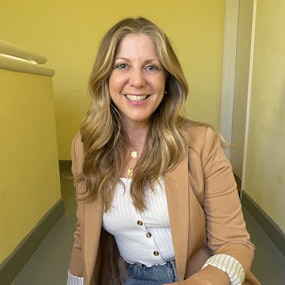
Julie McFadden
BSN, RN
BIO
Julie McFadden, BSN, RN has been a nurse for 15 years. Julie is an experienced ICU, and now Hospice/Palliative Nurse.
Julie has been featured in Newsweek, USA today, The Atlantic, The Business Insider, Medscape, People, Buzz feed, and several other articles worldwide.
Julie has been passionate about normalizing death through education to the masses using social media. Her tiktok has 1.2 M followers, and you can find her on all social media platforms (Instagram, Facebook, and YouTube) at Hospice Nurse Julie.
You can find her on TikTok, Instagram, and YouTube












